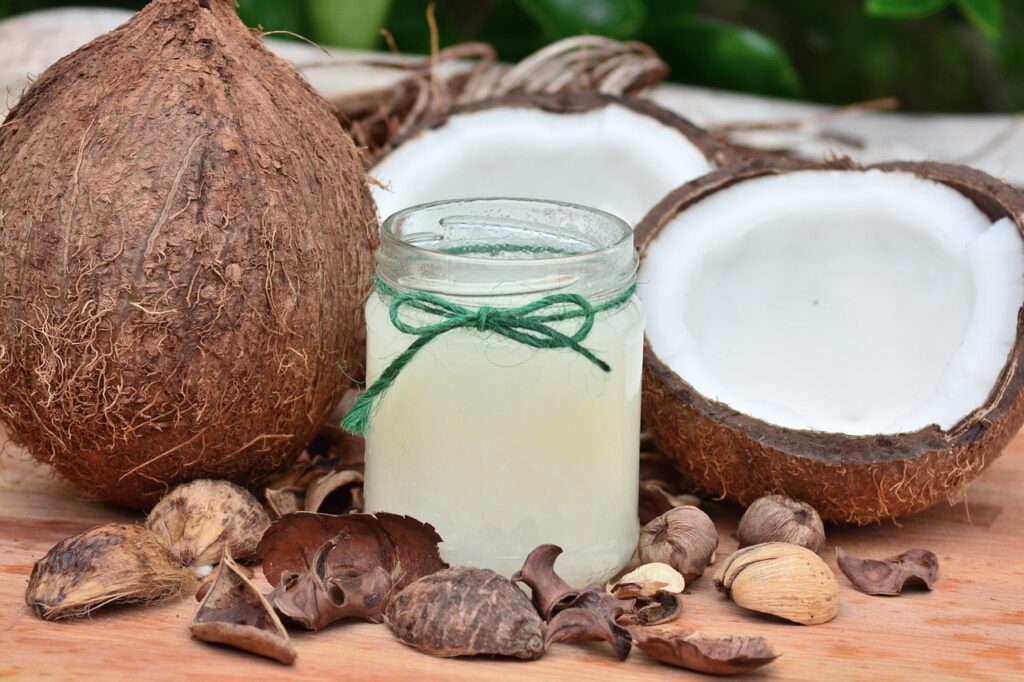
 By
Stylist Venita
By
Stylist Venita

I’ve always been a bit of a skincare junkie. I’ve tried countless products, from expensive serums to DIY masks.
But it wasn’t until I became a mom of two that I really started to prioritize natural skincare. I was tired of the harsh chemicals and the endless list of ingredients that I couldn’t pronounce. That’s when I discovered the power of natural oils, especially castor oil and coconut oil.
In this short post, let’s compare these two popular oils and help you determine which one is best for your skin.
Before deciding which oil is best for your skin, it’s essential to understand your skin type. Skin care is not one-size-fits-all, and knowing your specific needs helps ensure you’re using the right products. Typically, skin falls into three main categories:

Oily skin often results in a shiny appearance, particularly in the T-zone (forehead, nose, and chin), and can be more prone to clogged pores and breakouts. However, with the right products, you can manage oil production and keep acne under control.
2. Dry Skin: If your skin often feels tight, rough, or flaky, you might have dry skin.

This type of skin lacks sufficient moisture and natural oils, which can lead to irritation, sensitivity, and a dull complexion. Hydration and nourishment are key to keeping dry skin soft and smooth.
3. Combination Skin: A mix of both oily and dry areas, combination skin is commonly characterized by an oily T-zone (forehead, nose, and chin) with drier patches, usually on the cheeks.

Finding the right balance in products can be tricky, as you need to address both oil control and hydration.

Castor oil is a vegetable oil derived from the Ricinus communis plant, which is common in the Eastern areas of the world. It is rich in ricinoleic acid, a fatty acid that has anti-inflammatory and antimicrobial properties.

Coconut oil is another popular natural oil that has gained a lot of attention in recent years. It is rich in saturated fats, including lauric acid, which has antibacterial properties.
While coconut oil is a great moisturizer, it can be comedogenic, meaning it can clog pores and contribute to acne. This is especially true for people with oily or acne-prone skin.
Now that we’ve covered the basics of skin types, let’s break down how castor oil and coconut oil compare. While both oils offer unique benefits, they aren’t necessarily suited for every skin type or concern. The table below outlines the key features, benefits, and potential drawbacks of each oil to help you decide which is the better fit for your skin:
| Feature | Castor Oil | Coconut Oil |
|---|---|---|
| Skin Type | Suitable for all skin types | Best for dry or normal skin |
| Benefits | Anti-inflammatory, antimicrobial, moisturizing | Moisturizing, antibacterial, anti-inflammatory |
| Potential Drawbacks | Can be thick and sticky; may clog pores if overused | Can be comedogenic (clogs pores), especially for oily or acne-prone skin |
The answer is…
It depends on your skin’s unique needs.
If you’re dealing with acne-prone skin or looking to reduce scarring, castor oil may be the better choice. Its anti-inflammatory and antimicrobial properties make it particularly effective for calming irritation and preventing breakouts. Additionally, its ability to moisturize without being overly greasy helps maintain a balanced complexion.
On the other hand, if you have dry or normal skin and are primarily seeking hydration, coconut oil could be your go-to. Its moisturizing and antibacterial benefits make it ideal for those who want to lock in moisture and maintain a soft, smooth skin texture.
Whichever oil you choose, always remember to patch test first and listen to your skin’s response. Skincare is personal, and what works for one person might not work for another. Start with small amounts and adjust as needed to find what makes your skin happiest!
Yes, you can combine castor oil and coconut oil in your skincare routine. Mixing them can balance out the heavier consistency of castor oil with the lighter feel of coconut oil. However, if you have acne-prone skin, use coconut oil cautiously as it can clog pores.
For castor oil, 2-3 times per week is usually sufficient, especially if you have oily or acne-prone skin. Coconut oil, being more moisturizing, can be used daily on dry skin or as needed. Always start slow to see how your skin reacts
Yes! Both oils can soothe irritation caused by shaving. Castor oil’s anti-inflammatory properties help reduce redness and inflammation, while coconut oil’s moisturizing benefits prevent dryness and razor bumps. You can apply either oil after shaving to calm and hydrate the skin.
If you have sensitive skin, castor oil might be a better option due to its soothing properties. Coconut oil can sometimes irritate sensitive skin or clog pores, especially if your skin is prone to breakouts. Patch testing is key before committing to either oil.
Absolutely! Both castor oil and coconut oil are great for hair care. Castor oil can help with hair growth and scalp health, while coconut oil adds moisture and shine. You can apply them as a hair mask or to treat dry ends.
Never miss an important update. Be the first to receive our exclusive beauty tips straight into your inbox.